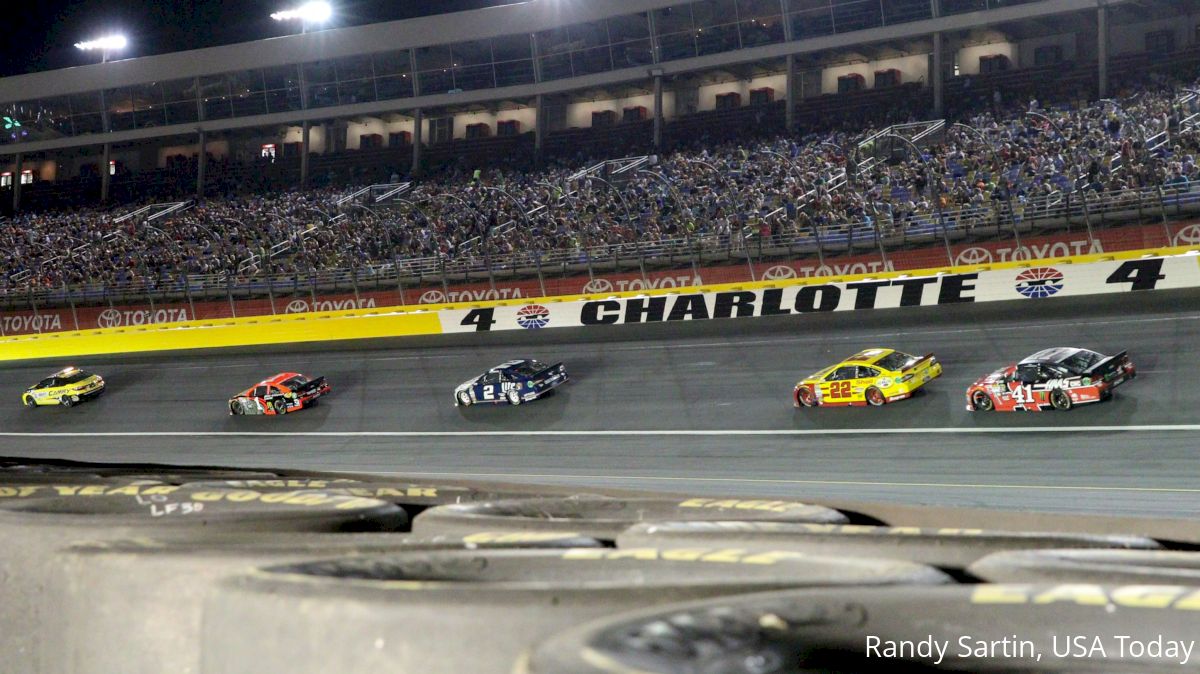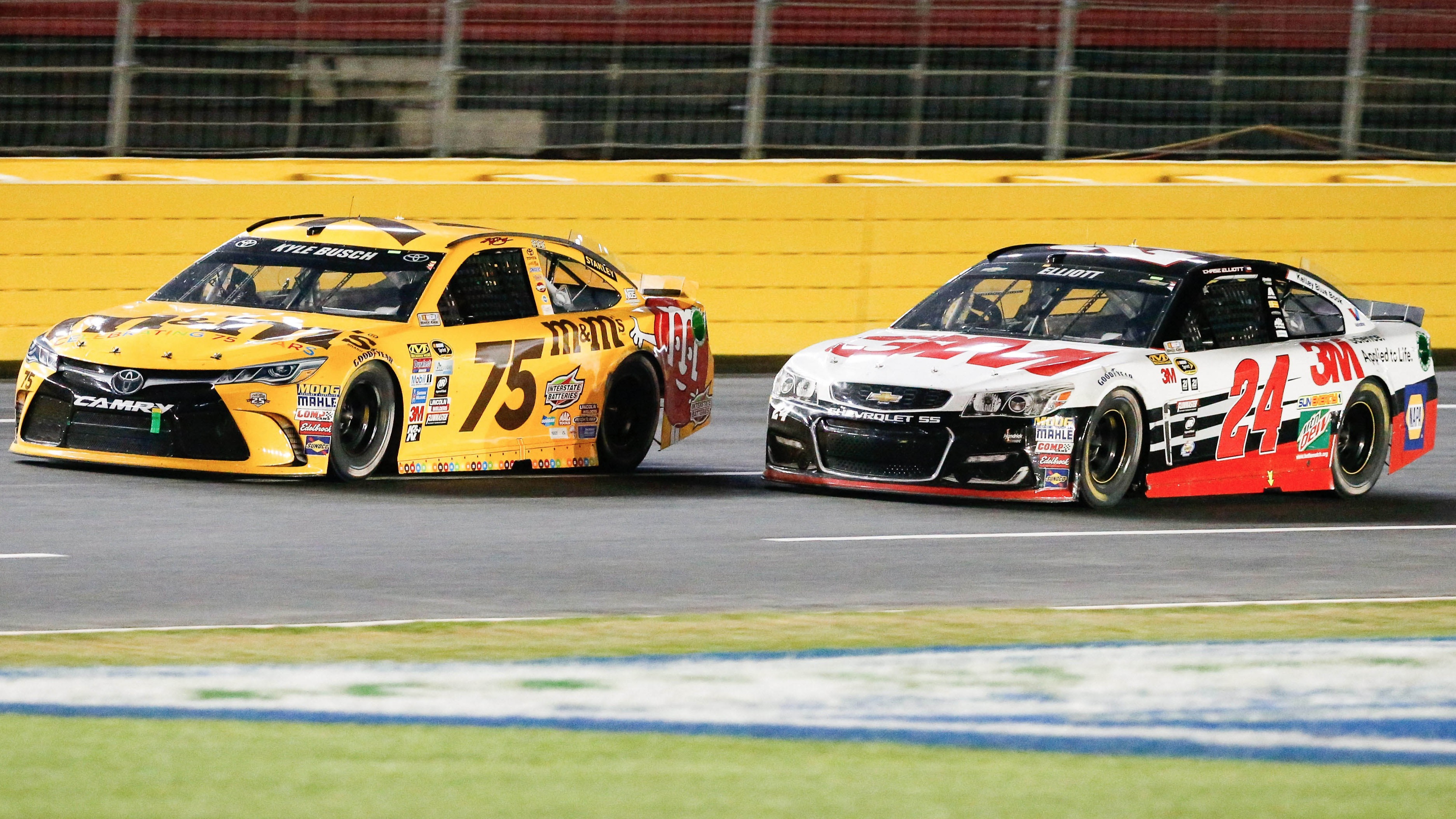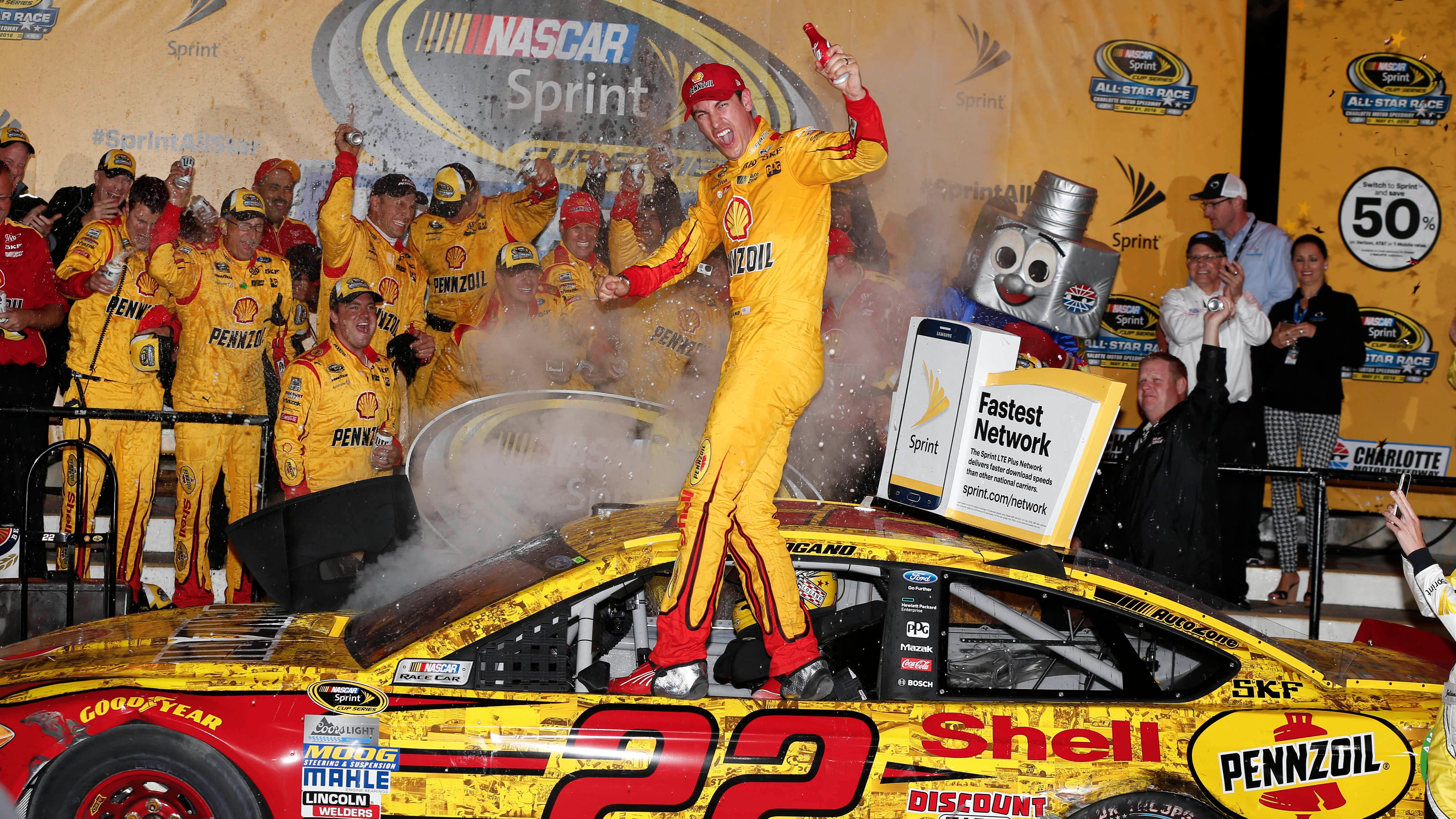NASCARMay 19, 2017 by JD Hellman
After 31 Years, It Is Time To Make Bigger Changes To NASCAR's All-Star Race
After 31 Years, It Is Time To Make Bigger Changes To NASCAR's All-Star Race
NASCAR has made many changes to the All-Star Race during their 30-year history, but they have been reluctant to make the change that matters most.

Much like its counterparts in the NFL, MLB, the NBA, and NHL, NASCAR holds an annual all-star event to showcase the best of the best in its league.
The Monster Energy NASCAR Cup All-Star Race gets started Saturday with the All-Star Open qualifying race taking the green flag at 6 PM ET. The winner and runner-up advance into the main event, which is scheduled to begin at 8 PM ET.
Similar to what we've seen this year in regular-season, points' paying races, there are four stages in the All-Star Race, with three stages of 20 laps and a 10-lap, winner-take-all sprint that will see the first driver across the start-finish line taking home a cool $1 million.
The All-Star Race is the second main event of what is part of the so-called "10 Days of Thunder" at Charlotte Motor Speedway, which caps off with the Coca-Cola 600, the longest race on the NASCAR schedule, on May 28.
Over time, the 10 Days of Thunder has become a mid-spring version of NASCAR's Speedweeks, which lead up to the season-opening Daytona 500 in February.
There's lots of action, lots of various events, and enough to keep fans who either live in the Charlotte area or travel there busy during that 10-day period. There's the races, visits to team headquarters, the NASCAR Hall of Fame, and more.
While the All-Star Race does not award standings points for the drivers who qualify for it, the $1 million prize is pretty strong incentive nonetheless, as it's the second-highest payday for a race win each year after the Daytona 500.
Admittedly, there are a few things that continue to nip at the ASR's ankles -- and have nipped at those ankles for at least the last 10-plus years. With Monster Energy as the new series' entitlement sponsor, perhaps it's time to finally listen to those ankle-biters.

First -- and if NASCAR had to choose between the ASR format or the location of the race itself -- the format should be the first thing to change.
Over the last decade-plus (actually, maybe closer to the last 20 years), NASCAR has changed the race format virtually every year. One year it's been a 70-lap race (like this year). Other years, it's been 90 laps, maybe even 100. The segments have also varied from 10 to 20 to even 30 laps.
While NASCAR has made these changes to stimulate interest in both fans and drivers, it's also caused serious consternation among those same fans and drivers because of the constant feeling -- or need (if needed) -- to change the format each and every year or perhaps every other year just to keep the interest up.
That's the wrong point of view. It's almost like the spray-and-pray or build-it-and-they-will-come theories.
Why can't NASCAR settle on one uniform theme and keep things that way. If it wants to have a four-segment, 70-lap race like it has this year, why can't it keep it that way? Familiarity breeds more interest, particularly among fans. It's safe to say there are numerous fans who have grown so tired of the format changes in the All-Star Race that they've lost interest in it.
You don't see MLB, NFL, NBA, or NHL officials change the basic format of their own all-star races every year, do you? Not at all. Sure, there may be some ancillary elements like MLB's Home Run Derby or the NBA's Rookie Game, but the main event remains the same -- as does its format.
So maybe Monster Energy will convince NASCAR to either keep this year's ASR format a permanent structure and signature of the race itself -- ditto for the ASR Open qualifying race as well as the fan vote that selects one entrant based upon balloting by fans.
Or not.
NASCAR has still not officially announced the length of the entitlement sponsorship with Monster Energy. Some reports have it as just a two-year deal, with at least another two-year option extension if both parties agree to it.
Other reports have it as simply a two-year entitlement deal, with review to extend the agreement for additional years after the first two-year segment concludes.
But if Monster Energy truly is in it for the long haul, might it not be prudent to create an All-Star Race that not only speaks to Monster Energy's lifestyle and brand but also leaves a foundation upon which to build a new style of ASR that will become a permanent format?

Which leads to the other option that could help enhance interest in, attendance at, and viewership of the race: moving the ASR to different racetracks each season.
This is not a knock against the folks at Charlotte Motor Speedway. For 31 of the event's 32 years (it began at Atlanta Motor Speedway in 1986), CMS has provided an outstanding venue and done all in its power to ensure fans, drivers, teams, and families have a great overall experience.
CMS has made the ASR a virtual textbook case for other motorsports series -- and even other sports leagues -- to follow when it comes to putting on a successful all-star event.
Will the stands be filled Saturday night? Possibly. But there's also the chance CMS might wind up being only three-quarters full, if that, given how NASCAR's at-track attendance has continued to slide in 2017.
Which begs the question: in a series that is unquestionably struggling at both the box office and on the TV screen, does NASCAR and Monster Energy take away one of the more solid, reliable events and move it to another venue?
Or is it better to keep things status quo and stay in Charlotte because fans and teams pretty much know what they are getting based upon the track's 31-year history with the ASR?
What if NASCAR and Monster Energy put the 2018 All-Star Race at, say, Bristol or Homestead or Texas? Would the change be significant enough that more fans -- particularly those who live in the surrounding areas of those individual tracks -- would flock to those locations and wind up drawing bigger crowds than Charlotte has done for more than three decades?
Another option is to alternate the ASR sites, with one year at Charlotte, the next at another track in the series, then back to CMS the next year, and then yet another track the following year after that.
Or perhaps there should be a clean break in which the ASR will spend the next 23 years at all 23 NASCAR host tracks, alternating throughout the overall NASCAR circuit (including the restrictor-plate tracks at Daytona and Talladega)?
That, of course, would or should be predicated on whether Monster Energy will be sticking around as entitlement sponsor for more than just this year and next.
Change in general is oftentimes hard to swallow for many people. That's particularly true in NASCAR, which has gone through so many changes over the last decade-plus that the sport is a far cry from what it was coming into this century.
We've seen countless rules changes (many during the course of a season, which is one of the more aggravating things to NASCAR fans), car designs, emphasis on adding aero (and then taking it away), and so much more.
Would moving the ASR to other venues ultimately be the linchpin that leads to perhaps the most damage of all among fans and teams? At least with CMS, they know what they're getting.
Then again, other tracks might wind up doing an equal -- if not better -- job at throwing a party-like event that would draw fans both with tickets or watching on TV. The All-Star Race is designed to bring out the best in drivers and teams. What about bringing out the best in individual tracks that would host it?
Admittedly, it's a conundrum that NASCAR has struggled with for years -- and is likely to continue to struggle with unless Saturday's race finally tips the scale one way or the other.
As the rock group The Clash sang in their 1982 hit, "Should I Stay Or Should I Go?" it's the same situation with NASCAR. Will we get more clarity on the answer to that question Saturday night?
Time -- as well as how long Monster Energy remains as entitlement sponsor -- may very well tell.
The Monster Energy NASCAR Cup All-Star Race gets started Saturday with the All-Star Open qualifying race taking the green flag at 6 PM ET. The winner and runner-up advance into the main event, which is scheduled to begin at 8 PM ET.
Similar to what we've seen this year in regular-season, points' paying races, there are four stages in the All-Star Race, with three stages of 20 laps and a 10-lap, winner-take-all sprint that will see the first driver across the start-finish line taking home a cool $1 million.
The All-Star Race is the second main event of what is part of the so-called "10 Days of Thunder" at Charlotte Motor Speedway, which caps off with the Coca-Cola 600, the longest race on the NASCAR schedule, on May 28.
Over time, the 10 Days of Thunder has become a mid-spring version of NASCAR's Speedweeks, which lead up to the season-opening Daytona 500 in February.
There's lots of action, lots of various events, and enough to keep fans who either live in the Charlotte area or travel there busy during that 10-day period. There's the races, visits to team headquarters, the NASCAR Hall of Fame, and more.
While the All-Star Race does not award standings points for the drivers who qualify for it, the $1 million prize is pretty strong incentive nonetheless, as it's the second-highest payday for a race win each year after the Daytona 500.
Admittedly, there are a few things that continue to nip at the ASR's ankles -- and have nipped at those ankles for at least the last 10-plus years. With Monster Energy as the new series' entitlement sponsor, perhaps it's time to finally listen to those ankle-biters.

Change Breeds Contempt
First -- and if NASCAR had to choose between the ASR format or the location of the race itself -- the format should be the first thing to change.
Over the last decade-plus (actually, maybe closer to the last 20 years), NASCAR has changed the race format virtually every year. One year it's been a 70-lap race (like this year). Other years, it's been 90 laps, maybe even 100. The segments have also varied from 10 to 20 to even 30 laps.
While NASCAR has made these changes to stimulate interest in both fans and drivers, it's also caused serious consternation among those same fans and drivers because of the constant feeling -- or need (if needed) -- to change the format each and every year or perhaps every other year just to keep the interest up.
That's the wrong point of view. It's almost like the spray-and-pray or build-it-and-they-will-come theories.
Why can't NASCAR settle on one uniform theme and keep things that way. If it wants to have a four-segment, 70-lap race like it has this year, why can't it keep it that way? Familiarity breeds more interest, particularly among fans. It's safe to say there are numerous fans who have grown so tired of the format changes in the All-Star Race that they've lost interest in it.
You don't see MLB, NFL, NBA, or NHL officials change the basic format of their own all-star races every year, do you? Not at all. Sure, there may be some ancillary elements like MLB's Home Run Derby or the NBA's Rookie Game, but the main event remains the same -- as does its format.
So maybe Monster Energy will convince NASCAR to either keep this year's ASR format a permanent structure and signature of the race itself -- ditto for the ASR Open qualifying race as well as the fan vote that selects one entrant based upon balloting by fans.
Or not.
NASCAR has still not officially announced the length of the entitlement sponsorship with Monster Energy. Some reports have it as just a two-year deal, with at least another two-year option extension if both parties agree to it.
Other reports have it as simply a two-year entitlement deal, with review to extend the agreement for additional years after the first two-year segment concludes.
But if Monster Energy truly is in it for the long haul, might it not be prudent to create an All-Star Race that not only speaks to Monster Energy's lifestyle and brand but also leaves a foundation upon which to build a new style of ASR that will become a permanent format?

Spread The Love
Which leads to the other option that could help enhance interest in, attendance at, and viewership of the race: moving the ASR to different racetracks each season.
This is not a knock against the folks at Charlotte Motor Speedway. For 31 of the event's 32 years (it began at Atlanta Motor Speedway in 1986), CMS has provided an outstanding venue and done all in its power to ensure fans, drivers, teams, and families have a great overall experience.
CMS has made the ASR a virtual textbook case for other motorsports series -- and even other sports leagues -- to follow when it comes to putting on a successful all-star event.
Will the stands be filled Saturday night? Possibly. But there's also the chance CMS might wind up being only three-quarters full, if that, given how NASCAR's at-track attendance has continued to slide in 2017.
Which begs the question: in a series that is unquestionably struggling at both the box office and on the TV screen, does NASCAR and Monster Energy take away one of the more solid, reliable events and move it to another venue?
Or is it better to keep things status quo and stay in Charlotte because fans and teams pretty much know what they are getting based upon the track's 31-year history with the ASR?
What if NASCAR and Monster Energy put the 2018 All-Star Race at, say, Bristol or Homestead or Texas? Would the change be significant enough that more fans -- particularly those who live in the surrounding areas of those individual tracks -- would flock to those locations and wind up drawing bigger crowds than Charlotte has done for more than three decades?
Another option is to alternate the ASR sites, with one year at Charlotte, the next at another track in the series, then back to CMS the next year, and then yet another track the following year after that.
Or perhaps there should be a clean break in which the ASR will spend the next 23 years at all 23 NASCAR host tracks, alternating throughout the overall NASCAR circuit (including the restrictor-plate tracks at Daytona and Talladega)?
That, of course, would or should be predicated on whether Monster Energy will be sticking around as entitlement sponsor for more than just this year and next.
Change in general is oftentimes hard to swallow for many people. That's particularly true in NASCAR, which has gone through so many changes over the last decade-plus that the sport is a far cry from what it was coming into this century.
We've seen countless rules changes (many during the course of a season, which is one of the more aggravating things to NASCAR fans), car designs, emphasis on adding aero (and then taking it away), and so much more.
Would moving the ASR to other venues ultimately be the linchpin that leads to perhaps the most damage of all among fans and teams? At least with CMS, they know what they're getting.
Then again, other tracks might wind up doing an equal -- if not better -- job at throwing a party-like event that would draw fans both with tickets or watching on TV. The All-Star Race is designed to bring out the best in drivers and teams. What about bringing out the best in individual tracks that would host it?
Admittedly, it's a conundrum that NASCAR has struggled with for years -- and is likely to continue to struggle with unless Saturday's race finally tips the scale one way or the other.
As the rock group The Clash sang in their 1982 hit, "Should I Stay Or Should I Go?" it's the same situation with NASCAR. Will we get more clarity on the answer to that question Saturday night?
Time -- as well as how long Monster Energy remains as entitlement sponsor -- may very well tell.